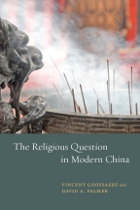

Recent events—from strife in Tibet and the rapid growth of Christianity in China to the spectacular expansion of Chinese Buddhist organizations around the globe—vividly demonstrate that one cannot understand the modern Chinese world without attending closely to the question of religion. The Religious Question in Modern China highlights parallels and contrasts between historical events, political regimes, and cultural movements to explore how religion has challenged and responded to secular Chinese modernity, from 1898 to the present.
Vincent Goossaert and David A. Palmer piece together the puzzle of religion in China not by looking separately at different religions in different contexts, but by writing a unified story of how religion has shaped, and in turn been shaped by, modern Chinese society. From Chinese medicine and the martial arts to communal temple cults and revivalist redemptive societies, the authors demonstrate that from the nineteenth century onward, as the Chinese state shifted, the religious landscape consistently resurfaced in a bewildering variety of old and new forms. The Religious Question in Modern China integrates historical, anthropological, and sociological perspectives in a comprehensive overview of China’s religious history that is certain to become an indispensible reference for specialists and students alike.

By looking at the activities of Taoist clerics in Peking, this book explores the workings of religion as a profession in one Chinese city during a period of dramatic modernization. The author focuses on ordinary religious professionals, most of whom remained obscure temple employees. Although almost forgotten, they were all major actors in urban religious and cultural life.
The clerics at the heart of this study spent their time training disciples, practicing and teaching self-cultivation, performing rituals, and managing temples. Vincent Goossaert shows that these Taoists were neither the socially despised illiterates dismissed in so many studies, nor otherworldly ascetics, but active participants in the religious economy of the city. In exploring exactly what their crucial role was, he addresses the day-to-day life of modern Chinese religion from the perspective of ordinary religious specialists. This approach highlights the social processes, institutions, and networks that transmit religious knowledge and mediate between prestigious religious traditions and the people in the street. In modern Chinese religion, the Taoists are such key actors. Without them, "Taoist ritual" and "Taoist self-cultivation" are just empty words.
READERS
Browse our collection.
PUBLISHERS
See BiblioVault's publisher services.
STUDENT SERVICES
Files for college accessibility offices.
UChicago Accessibility Resources
home | accessibility | search | about | contact us
BiblioVault ® 2001 - 2024
The University of Chicago Press









